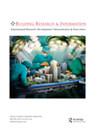Upscaling bio-based construction: challenges and opportunities
IF 3.7
3区 工程技术
Q1 CONSTRUCTION & BUILDING TECHNOLOGY
引用次数: 3
Abstract
ABSTRACT Construction projects using emerging bio-based materials have been realized over the past ten to fifteen years within Europe. Bio-based buildings utilize properties of natural materials to regulate internal environments, particularly fluctuations in temperature and relative humidity. Despite individual exemplar projects demonstrating functional performance and long-term operational cost savings, there hasn’t been a proliferation of commercial or domestic bio-based projects. With a growing shift towards circular economy construction, bio-based buildings could be readily adopted to meet this development. This study evaluates barriers faced by bio-based materials, making the upscaling of production and a breakthrough into mainstream construction challenging. Evaluation was achieved through senior professionals with experience in bio-based construction participating in semi-structured interviews based on core categories of finance, knowledge, and policy. Challenges include the upscaling of production by manufacturers of emerging materials, inconsistencies in life cycle assessment, material certification and accreditation, vested interests in the construction industry, and concerns regarding initial costs, availability, and knowledge of products. Potential solutions for upscaling bio-based construction are identified and include increased case studies, positive legislation, regional economic regeneration, the wellness agenda, long-term economic sustainability, and engagement with established construction companies. This insight has informed the procurement process, material evaluation, and adoption of policy.升级生物基建筑:挑战与机遇
摘要在过去的十到十五年里,欧洲已经实施了使用新兴生物基材料的建筑项目。生物建筑利用天然材料的特性来调节内部环境,特别是温度和相对湿度的波动。尽管个别示范项目展示了功能性能和长期运营成本节约,但商业或国内生物项目并没有激增。随着循环经济建设的日益转变,生物建筑可以很容易地被采用来满足这一发展。这项研究评估了生物基材料面临的障碍,使生产规模的扩大和向主流建筑的突破具有挑战性。评估是通过具有生物建筑经验的高级专业人员参加基于金融、知识和政策核心类别的半结构化面试来实现的。挑战包括新兴材料制造商的生产规模扩大、生命周期评估、材料认证和认可不一致、建筑行业的既得利益以及对初始成本、可用性和产品知识的担忧。确定了扩大生物建筑规模的潜在解决方案,包括增加案例研究、积极立法、区域经济再生、健康议程、长期经济可持续性以及与老牌建筑公司的合作。这种洞察力为采购过程、材料评估和政策制定提供了信息。
本文章由计算机程序翻译,如有差异,请以英文原文为准。
求助全文
约1分钟内获得全文
求助全文
来源期刊

Building Research and Information
工程技术-结构与建筑技术
CiteScore
8.60
自引率
7.70%
发文量
43
审稿时长
>12 weeks
期刊介绍:
BUILDING RESEARCH & INFORMATION (BRI) is a leading international refereed journal focussed on buildings and their supporting systems. Unique to BRI is a focus on a holistic, transdisciplinary approach to buildings and the complexity of issues involving the built environment with other systems over the course of their life: planning, briefing, design, construction, occupation and use, property exchange and evaluation, maintenance, alteration and end of life. Published articles provide conceptual and evidence-based approaches which reflect the complexity and linkages between cultural, environmental, economic, social, organisational, quality of life, health, well-being, design and engineering of the built environment.
 求助内容:
求助内容: 应助结果提醒方式:
应助结果提醒方式:


